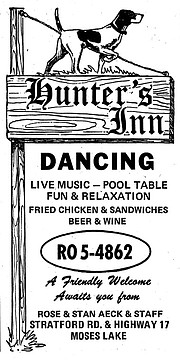Lindblad's book begins with 'Go West' poem
Herald Columnist | Hagadone News Network | UPDATED 12 years, 2 months AGO
The acknowledgment page of Frank Lindblad's book, "A Pioneer's Ballad," is full of names which have appeared in this column before. Do you recognize some of them?
Acknowledgments
In assembling and constructing these verses I am appreciative for the help received at night classes from my teacher Gary Frey. His assistance and advice were most valuable.
Many thanks to Gale Matthews, George and Clarence Rosenberg, Hilma Dahlgren, Cris and Clara Mordhorst, Ralph Osborne, Chris Larson, Gladys Fairburn, Olive Crabtree, Effie Dick, Ella Breiler, Amy Allen, Charles, Mabel and Alfhild Lindblad, Ethel Hamer, Robin Saunders, Hildebrand Studio, E.R. Kalmbach and others for pictures, typing or other assistance. - Frank W. Lindblad
Today we offer the first part of the first poem in the book:
Go West
In nineteen one, the urge to roam,
Brought wanderlust into our home
On broad midwestern prairie.
Homeseekers' guides that pictured thrills
On virgin land beyond the bills
Implored us not to tarry.
In Washington is new Big Bend,
A tract of land by river hemmed
With railroad running through it.
This vast frontier is going fast
At selling price that cannot last;
Delay and you will rue it.
Its coldest spell will quickly pass.
All livestock winters out on grass,
Which always keeps them stronger.
The working stock is set to go
When fields have lost their winter snow
And daylight hours grow longer.
In winter you can cut the brush
From land to save the springtime rush
Preparing it for farming.
A plow, a harrow, disk, and drill
Your tillage needs will amply fill.
This land is really charming.
So Dad set out with fervent hopes,
By rail soon crossing Rockies' slopes
And reaching Inland Empire.
A hundred miles beyond Spokane
With team and hack the drive began
To land of his desire.
Continued next week.
E-mail from Cheryl
Facts from the past gleaned from the Moses Lake Herald, Columbia Basin Herald and The Neppel Record by Cheryl (Driggs) Elkins:
From the Columbia Basin Herald on Sept. 28, 1950:
Bureau engineer at Quincy retires
Leslie R. Annett, 70, who started working for the government in 1902 as a surveyor with what was then called the reclamation service, retires tomorrow after spending 19 and a half years as a federal employee, according to H.A. Parker, supervising of the Columbia Basin's Irrigation Division.
Annett is stationed at Quincy, and ends his government career as an engineering aid with the Bureau of Reclamation. In the interim he has been with several other government agencies, has spent many years in private industry, and served as a captain of engineers during World War I.
State capitol contested
When the capitol of Washington was chosen, North Yakima, Vancouver and Ellensburg were strong contenders against Olympia.
Statehood on Feb. 22
The enabling act to give Washington statehood was signed on Washington's birthday in 1889.
ARTICLES BY HERALD COLUMNIST

Spotting wildlife difficult at times
Bill Witt was driving my Dodge Ram as I scanned the landscape from the passenger seat. We were looking for elk east of the town of Kittitas. Movement was noticed and three white rumps spotted.

The legend of Four-Fish Crawler

Outdoors: Firearm related terms educate readers
From time to time this column has featured simple facts about outdoor-related topics, such as facts about wildlife or names of wildlife young. Today we will tackle a few firearm-related facts, supplied by the National Rifle Association and the National Shooting Sports Foundation.



